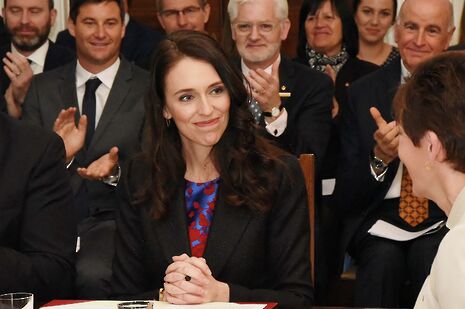For women and men, ‘having it all’ is an outdated illusion
In light of the announcement of Jacinda Ardern’s pregnancy, columnist Connor MacDonald argues that a fulfilling career cannot come without sacrifices

This week, the Prime Minister of New Zealand announced that she was pregnant. The world rightly sent their well-wishes and a victory for feminism was hailed. In particular, there was praise for her husband, who will become the primary caregiver. Women could, in 2018, have it all. However, the adulation that has emerged from all corners of the world has been wildly misplaced: men and women cannot, will not and should not ever have or want it all.
By this I do not mean, as some troglodyte columnists and twitterati have suggested, that Ardern will not be able to carry out her duties as Prime Minister. Such a claim is obviously absurd. Pregnancy will likely stop the Prime Minister as much as excessive drinking habits stopped Churchill (i.e. not much). However, those rightly praising the Prime Minister should also recognise that being Prime Minister while raising a child will require significant sacrifices in her personal life, and in her relationship with her child.
“We should not pretend that choosing a career-focused path is necessarily the obvious or surest one; it comes with its own costs as well”
Allow me to offer a personal anecdote. When I was about 17 or 18, my mother and I had a conversation about my desire to lead a career-oriented life. She impressed upon me the importance of finding a partner who will have time to be the primary caregiver, but crucially made a second even more important point (and I paraphrase): ‘be under no illusions – your relationship with your children will be not be as deep as your partner’s. You will not know your children like she will.’ She then spoke about my parent’s choices: they could have lived in Toronto, been highly career-oriented and been far more successful financially. Instead, my mother and father chose to move to a quieter, slower and more rural place to raise the three of us.
Make no mistake, my parents would both have liked more professional fulfilment. But imagine if the situation was reversed – we would have wished for closer relationships with each other, and I’m sure my parents would have wished for more time to see us when we were growing up. The fact is either course of action – to seek professional fulfilment or to invest in raising children – are fraught with a plethora of choices, of which each has costs and benefits.
Which brings me back to Jacinda Ardern. I reject completely the notion that her choices amount to having it all. There will no doubt be times when the vagaries of her office mean she will not see her family for days on end. That will surely take its toll. We should not pretend that choosing a career-focused path is necessarily the obvious or surest one; it comes with its own costs as well.
This also has implications for men. One of the most bizarre developments, I would suggest, of the modern age is that ‘having it all’ has become so closely associated with how men lived their lives in the late 1900s: wife with the children at home, long hours in the office. Yet, my mother remembers my grandfather bursting into tears as she went off to university: “just as you get interesting, you have to leave the house”. That relationship simply didn’t have much there before she was an adult. I do not accept that this model was costless, nor one to necessarily emulate: it contains choices and trade-offs too.
The sub-text that then flows under much of Jacinda Ardern’s announcement, that her husband is foregoing career fulfilment to stay at home with the kids, is invidious also. While it may be a sacrifice on his part, it is also a choice that provides benefits – to be closer to his children, to build stronger relationships with them and to be there at every moment as they grow up and flourish. At the same time, the Prime Minister will have to forego such benefits. In both cases, there is no such thing as a free lunch.
If nothing else, praise for Jacinda Ardern reveals two things about where we are as a society. First, we are (thank goodness) at a moment where the vast majority of opinion can line up behind a professional women at the top of her field, not against her. On the other hand, we are still not at a place where we can have a mature conversation about professional life and the sacrifices it entails. Until that time, young men and women will go out into the world still chasing an elusive dream
 News / Judge Business School advisor resigns over Epstein and Andrew links18 February 2026
News / Judge Business School advisor resigns over Epstein and Andrew links18 February 2026 News / Gov grants £36m to Cambridge supercomputer17 February 2026
News / Gov grants £36m to Cambridge supercomputer17 February 2026 News / Hundreds of Cambridge academics demand vote on fate of vet course20 February 2026
News / Hundreds of Cambridge academics demand vote on fate of vet course20 February 2026 News / CUCA members attend Reform rally in London20 February 2026
News / CUCA members attend Reform rally in London20 February 2026 News / Union speakers condemn ‘hateful’ Katie Hopkins speech14 February 2026
News / Union speakers condemn ‘hateful’ Katie Hopkins speech14 February 2026










